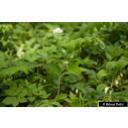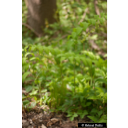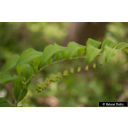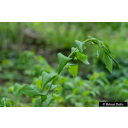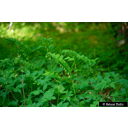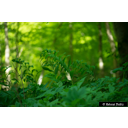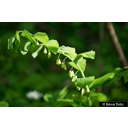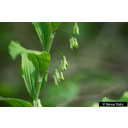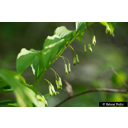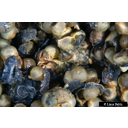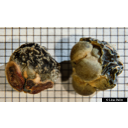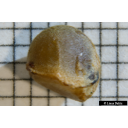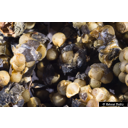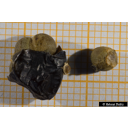Wissenswertes zu diesem Pflanzenindivuduum
Polygonatum multiflorum (L.) All. 1785
Asparagaceae
- Spargelgewächse (APG IV)Vielblütige Weißwurz
Akzessionnummer: SYS-2228
Pflanzjahr: 0
Taxonkonzept: The Plant List (2014), version 1.1
Verbreitung: Europa, Türkei, Kaukasus, Himalaya, Japan
Größe: 0,3 - 0,6 (m)Blütezeit: V - VI
Polygonatum multiflorum (L.) All. - Accepted: Polygonatum multiflorum (L.) All. bei Zander 2008; Familie: Convallariaceae (Zander 2008)Polygonatum multiflorum (L.) All. - Accepted: Polygonatum multiflorum (L.) All. bei The Plant List (2014), version 1.1; Familie: Asparagaceae (APG III)Polygonatum multiflorum (L.) All. - Accepted: Polygonatum multiflorum (L.) All. bei Schmeil-Fitschen 2019; Familie: Asparagaceae (APG IV)Polygonatum multiflorum (L.) All. - Accepted: Polygonatum multiflorum (L.) All. bei Rothmaler 2011; Familie: Asparagaceae (APG IV)Polygonatum multiflorum (L.) All. - Accepted: Polygonatum multiflorum (L.) All. bei BfN Checklist Flora DE; Familie: Asparagaceae (APG IV)Polygonatum multiflorum (L.) All. - Accepted: Polygonatum multiflorum (L.) All. bei World Flora Online - APG IV (Angiosperms); Familie: Asparagaceae (World Flora Online - APG IV (Angiosperms))
- Blütenfarbe
- weiß
- Blüten
- Blüten zu zwei bis fünf, Staubfäden behaart
- Schutzstatus, Rote Liste
- Ungefährdet in DE (*)
- Lebensform
- Geophyt, krautig, terrestrisch, ausdauernd (Staude)
- Blätter
- Blätter ausgebreitet
- Bodenbedingungen
- frische, nährstoff- und basenreiche, neutral bis mäßig sauren, lockeren Lehmböden
- Lichtbedingungen
- Schattpflanze
- Lichtbedingungen (Symbole)
- ●
- Natürliches Vorkommen (Habitat)
- krautreiche Buchen-, Eichen- und Nadelmischwaldgesellschaften
- Kommentar zur Ökologie
- Mullboden-Kriecher, Bodenlockerer
- Vegetationstypus und Synökologie (Pflanzengesellschaft)
- Ord. Fagetalia sylvaticae
- Status der Einbürgerung
- I
- Blütenbesuch durch polylektische Wildbienen
- Osmia pilicornis
- Spross
- Stängel rund
BfN (2010): Artenfilter und Kartendienst für regionales gebietseigenes Saat- und Pflanzgut krautiger Arten, Accessed: 03.06.2025. See: https://regionalisierte-pflanzenproduktion.de/artenfilter.htm; Erhardt, W., Götz, E., Bödeker, N. & Seybold, S. (2008): Der große Zander. Enzyklopädie der Pflanzennamen. Band 2. Arten und Sorten. Eugen Ulmer KG, Stuttgart (Hohenheim), 18. Aufl., 2103 S.; Haider, M. et al. (2005): Wildbienenkataster. See: https://www.wildbienen-kataster.de; Kew Gardens and Collaborators (2017): Plants of the World Online. see: plantsoftheworldonline.org.; Oberdorfer, E. (2001): Pflanzensoziologische Exkursionsflora. Für Deutschland und angrenzende Gebiete. Eugen Ulmer Verlag, Stuttgart, 8., stark überarb. u. erg. Aufl, 1056 S. 978-3-8001-3131-0.; Parolly, G. et al. (2019): Schmeil-Fitschen: Die Flora Deutschlands und angrenzender Länder.. Quelle & Meyer Verlag, Wiebelsheim, 97. Aufl.; The International Plant Names Index (2009). Published on the Internet http://www.ipni.org; Courtesy to IPNI, 2009. Exported from IPNI at date: 2009-09-22 20:17:51; Westrich, P. et al. (2018): Die Wildbienen Deutschlands.. Ulmer Verlag ISBN 978-8186-0123-2.;
Diese Webseite verwendet Google Maps, um Karten und Standorte von Pflanzen in den Hohenheimer Gärten anzuzeigen. Dadurch werden unter Umständen Daten an Google weitergeleitet, was mit einer Verarbeitung Ihrer personenbezogenen Daten verbunden sein kann. Die Datenschutzerklärung von Google finden Sie hier: Datenschutzerklärung von Google

